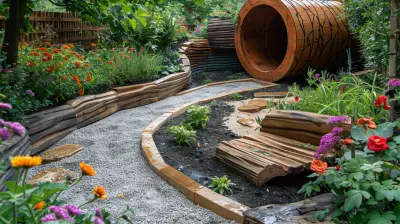How to Encourage Problem-Solving Skills in Toddlers
7 August 2025
Raising a toddler is like being a coach for a tiny, curious explorer. Everything they encounter is a new challenge or puzzle to solve. Whether it’s figuring out how to stack blocks without them tumbling down or deciding how to reach a toy that’s just out of grasp, toddlers are natural problem-solvers in the making.
But here's the thing—problem-solving isn’t just about puzzles or brain teasers. It's about nurturing a mindset where kids feel confident to tackle challenges, think critically, and persist even when things don’t go their way.
So, how can you encourage problem-solving skills in toddlers? Let’s dive in!

Why Problem-Solving Skills Matter in Early Childhood
Problem-solving isn't just a skill—it’s a life essential. From tying their own shoes to negotiating with friends over a toy, toddlers need to develop these abilities to navigate everyday life.
Cognitive Growth
Encouraging problem-solving strengthens a toddler’s brain, improving memory, reasoning, and decision-making. It’s like a mental workout that builds their ability to think independently.Boosts Confidence
When children figure things out on their own, they feel a sense of accomplishment. That confidence carries over into other areas of life, making them eager to face new challenges.Enhances Creativity and Flexibility
Problem-solving encourages creativity. The more children think outside the box, the more adaptable they become in different situations.Develops Patience and Resilience
Life isn’t always smooth sailing, and it's important for toddlers to learn that mistakes are part of the process. Learning how to keep going despite setbacks builds resilience.
How to Encourage Problem-Solving Skills in Toddlers
Now that we know why problem-solving is important, let’s look at simple yet effective ways to nurture these skills in toddlers.1. Let Them Struggle (Just a Little!)
It’s tempting to rush in and fix things when your toddler is struggling, but hold back! Give them time to figure things out. If their toy car won’t fit through a gap, wait before offering a solution. A little bit of struggle is good—it encourages them to think.What You Can Do:
- Instead of giving answers, ask questions: “What do you think will happen if you try turning it the other way?”- Allow them to attempt different solutions before stepping in.
2. Encourage Open-Ended Play
Toys that have multiple solutions (like blocks, playdough, or art supplies) are fantastic for problem-solving. Open-ended play allows toddlers to experiment and use their imagination.Great Toys & Activities for Open-Ended Play:
- Building blocks and LEGO- Puzzles with varying levels of difficulty
- Pretend play sets (kitchen, doctor kit, etc.)
- Sensory bins with different textures and materials
3. Teach Them to Break Problems into Steps
If a problem seems too big, toddlers can become frustrated. Teach them to break it down into smaller steps.Example:
If your child can’t put on their shoes, guide them step by step:1. Sit down.
2. Hold the shoe the right way.
3. Put toes in first.
4. Push the heel in.
This way, they see challenges as manageable rather than overwhelming.
4. Ask Thought-Provoking Questions
Instead of giving direct answers, guide toddlers toward solutions by asking the right questions.Examples:
- "What do you think will happen if we turn this puzzle piece around?"- "Why do you think the tower keeps falling?"
- "What else could we use to make this work?"
These questions encourage toddlers to think critically and explore different possibilities.
5. Read Books That Encourage Problem-Solving
Stories can be great tools for teaching problem-solving. Books where characters find creative ways to solve problems can inspire toddlers to do the same.Some Great Picks:
- The Very Hungry Caterpillar by Eric Carle (teaches perseverance and cause-and-effect)- Where’s Spot? by Eric Hill (encourages problem-solving through searching)
- Rosie Revere, Engineer by Andrea Beaty (inspires creativity and persistence)
6. Let Them Make Decisions
Even small choices give toddlers the opportunity to practice problem-solving. Let them decide between two outfits or choose which fruit they want for a snack. These little decisions build confidence and critical thinking.7. Play Problem-Solving Games
Simple games can turn problem-solving into a fun activity!Some Easy Problem-Solving Games:
- Hide and Seek: Encourages strategy and critical thinking.- Obstacle Courses: Helps them figure out how to move around barriers.
- Sorting Games: Ask them to group toys by color, shape, or size.
8. Model Problem-Solving Behavior
Kids learn by watching, so show them how you solve problems daily. If something isn’t working, talk through your thinking process out loud.Example:
“Oh no, I can’t find my keys! Let me retrace my steps. First, I was in the kitchen, then I went to the living room…”Seeing you handle challenges calmly teaches them how to approach their own problems.
9. Encourage “What If” Thinking
Asking “What if?” questions encourages creativity and flexible thinking.Fun “What If” Questions to Try:
- "What if cars could fly? Where would you go?"- "What if we had to build a house out of pillows? How would we do it?"
- "What if we had no spoons? How would we eat soup?"
These types of questions allow toddlers to think outside the box and explore different solutions.
10. Praise Effort, Not Just Success
Encourage perseverance by praising effort, not just the outcome. When your toddler tries to solve a problem, acknowledge their hard work instead of just the final result.Examples of Encouraging Praise:
- "I love how you kept trying different ways to make your tower stand!"- "You worked so hard on this puzzle. Even though it was tricky, you didn’t give up!"
This builds resilience and helps toddlers understand that effort is just as valuable as getting the “right answer.”

Final Thoughts
Problem-solving is a skill that will serve your toddler throughout their entire life. By allowing them to struggle a little, asking thought-provoking questions, engaging in open-ended play, and modeling problem-solving behavior, you’re setting them up for success.Remember, toddlers are naturally curious—they want to figure things out! Your role is to guide and support them rather than always giving answers. With patience and encouragement, you’ll help your child develop confidence, resilience, and a strong foundation for thinking independently.
So the next time your toddler faces a challenge, take a step back, ask a question, and watch their little brain go to work. You might be surprised at how clever their solutions can be!
all images in this post were generated using AI tools
Category:
Parenting ToddlersAuthor:

Zelda Gill
Discussion
rate this article
1 comments
Regina McGowan
Encouraging problem-solving in toddlers involves patience and creativity. Offer guidance through open-ended questions, let them explore solutions, and celebrate their efforts to foster confidence and resilience.
August 15, 2025 at 4:11 PM

Zelda Gill
Thank you for your insightful comment! I completely agree that patience, creativity, and open-ended questions are key to nurturing toddlers' problem-solving skills. Celebrating their efforts truly builds their confidence and resilience.


